
Geopolitical Report ISSN 2785-2598 Volume 41 Issue 19
SpecialEurasia OSINT Unit
Executive Summary
The global landscape is undergoing rapid transformation fuelled by the ascent of Artificial Intelligence (AI), a phenomenon that bears profound implications for international relations and the distribution of power among nations.
This report explores the complex relationship between AI and geopolitics, analysing how the advancement and use of AI are transforming the competitive landscape between countries, impacting military capabilities, and highlighting the need for global cooperation in establishing ethical guidelines.
The Ascendancy of AI as a Geopolitical Force
The advancement of AI technologies represents a pivotal frontier with far-reaching potential for both economic prosperity and military dominance.
Nations such as the United States, China, and Russia are fervently investing in AI research and development (R&D), recognising AI as not merely an innovation but a strategic necessity.
This fervent pursuit creates an atmosphere of fierce competition, hinting at a possible “AI arms race” and raising concerns about the autonomy of weapons systems and the potential loss of human control in the context of warfare.
Geopolitical Ramifications of AI
The use of AI by governments and companies can have far-reaching consequences, affecting international geopolitical dynamics and potentially increasing geopolitical risk.
Foremost among the ramifications of AI development is the prospect of significant economic advantages accruing to nations at the vanguard of AI innovation. AI-driven automation harbours the potential to redefine global supply chains, potentially precipitating the migration of jobs towards nations wielding the most sophisticated AI capabilities. Additionally, control over essential AI infrastructure, including powerful cloud computing platforms, could create new dependencies and grant significant strategic advantage to dominant countries.
AI stands poised to revolutionise the conduct of warfare, not solely through the proliferation of autonomous weapons systems but also through its manifold applications spanning intelligence analysis, logistical management, and cyber operations. Advanced AI brings the potential for real-time battlefield assessments, strategic troop deployments, and the ability to identify and exploit weaknesses in enemy systems. Nonetheless, there are significant concerns about the increasing presence of such weaponry, including the potential for unintended escalation because of AI-driven errors and the risk of human judgment being disregarded in important decision-making processes.
Global Governance Imperatives and the Imperative of International Collaboration
Beyond its economic and military implications, the emergence of AI presents a complex web of ethical challenges that call for international cooperation.
Issues such as algorithmic bias, privacy concerns attendant upon expansive data collection, and the spectre of societal control through AI underscore the imperative for concerted efforts to establish ethical frameworks and regulatory mechanisms.
The perpetuation of biases within AI algorithms threatens to exacerbate extant inequalities, while the wholesale aggregation of personal data raises red flags pertaining to individual privacy and the latent misuse of sensitive information.
Furthermore, the possibility of AI being used for social surveillance and control highlights the urgent need for international discussions to encourage responsible development and use of AI.
The responsible cultivation and utilisation of AI mandates robust international collaboration across myriad domains. Key areas warranting concerted action encompass:
- Harmonisation and Standardisation. The establishment of common ethical principles and technical standards for AI development is pivotal in obviating a fragmented global landscape typified by competing AI ecosystems and regulatory frameworks. This could involve engaging in diplomatic talks to establish international treaties, implementing industry-wide standards, and sharing best practices to ensure the responsible advancement of AI technologies.
- Arms Control Regimes. The global discussion on the regulation of autonomous weapons systems and the importance of human supervision in military AI applications is vital in preventing an arms race and minimising the potential dangers of AI-driven weapons. This could entail the formulation of international accords akin to extant treaties governing nuclear proliferation or biological warfare, foregrounding principles of transparency and circumscribed limitations on specific categories of AI-driven armaments.
- Data Governance Protocols. The elaboration of international frameworks governing data privacy and ownership is indispensable to engender trust and foster collaboration in the digital milieu. This could involve clarifying rules about where data is stored, empowering users to control their personal data, and establishing methods to foster global collaboration on data-related matters.
- Establishment of Global AI Oversight. A dedicated international organisation focused on AI governance could help facilitate discussions on AI ethics across borders, encourage responsible development practices, and proactively monitor emerging risks. Similar to existing international organisations like the International Atomic Energy Agency (IAEA), this entity would have the authority to oversee global AI-related endeavours.
Conclusion
The advent of AI has positioned it as a force of immense magnitude, capable of catalysing profound transformations that will reverberate throughout the geopolitical spectrum.
Through the promotion of strong international collaboration, countries have the ability to utilise AI as a powerful tool that can contribute to the common good, promote economic growth that is both inclusive and sustainable, enhance security by integrating AI judiciously within the military, and ensure that ethical principles are upheld to protect individual rights and freedoms.
Read also | The Rising Challenges of Malicious Use of Artificial Intelligence to International Psychological Security |
For further information, reports, and risk assessments about the impact of AI on the geopolitical dynamics, contact us at info@specialeurasia.com.



